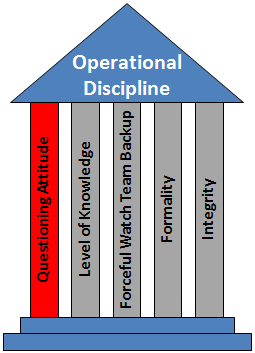 Proactively addressing risk and anticipating what may go wrong by having a Questioning Attitude is a critical aspect of driving Operational Discipline within your firm and ultimately achieving Operational Excellence. Doing the right thing, the right way, every time requires vigilance to ensure what were previously identified as “right thing” and the “right way” are still the “right thing” and the “right way.” That is where Questioning Attitude, one of our 5 Pillars of Operational Discipline, plays such an important role. Having a Questioning Attitude does not come from a lack of trust for others or a belief that you or your fellow employees are ill-prepared to complete the task at hand. But rather, it comes from a belief that there may be better ways of doing things and that the best way to manage/mitigate risks is by proactively identifying and addressing them.
Proactively addressing risk and anticipating what may go wrong by having a Questioning Attitude is a critical aspect of driving Operational Discipline within your firm and ultimately achieving Operational Excellence. Doing the right thing, the right way, every time requires vigilance to ensure what were previously identified as “right thing” and the “right way” are still the “right thing” and the “right way.” That is where Questioning Attitude, one of our 5 Pillars of Operational Discipline, plays such an important role. Having a Questioning Attitude does not come from a lack of trust for others or a belief that you or your fellow employees are ill-prepared to complete the task at hand. But rather, it comes from a belief that there may be better ways of doing things and that the best way to manage/mitigate risks is by proactively identifying and addressing them.
However, having a Questioning Attitude alone it is not enough to proactively manage risk—the appropriate Level of Knowledge to understand and assess situations and ask the right questions is also needed, as is the Integrity that drives always doing the right thing. As we explore more of the 5 Pillars of Operational Discipline the bigger picture of how the pillars all support each other and work in concert to drive Operational Discipline begins to take shape. After our final post describing the individual pillars, we will revisit that idea and show how the pillars are self-reinforcing and that commitment to all of them is required to develop a culture of Operational Discipline.
What does a properly motivated Questioning Attitude look like in a company’s day-to-day operations? It could be as simple as an operator inspecting his work space at the beginning of his shift to make sure that everything is in place, all machinery settings are correct and nothing appears to be out of the ordinary. He is trying to anticipate what might go wrong and address it before it does. He may also notice that a certain aspect of his operation is routinely generating a lot of scrap which leads him to ask (himself, his co-workers and the manufacturing engineers that support him) if there is a better way to do that part of his job.
Having a Questioning Attitude is not confined to the shop floor and physical processes/procedures, it is important in all aspects of your company. When leaders are conducting site visits or audits, it is important for them to look beyond just the checklist of items they may be looking at. They should assess the operation in its entirety and ask questions to understand what is going on and what might go wrong. Not only does this surface potential risks before they manifest themselves, but it also drives the right behaviors across the organization through leadership by example.
Instilling a culture of Operational Discipline requires the recognition that conditions (internal and external) will change over time and that diligence is needed to ensure that the “right thing” and the “right way” are maintained and updated. And that the best way to manage risk is by seeking out potential issues and risks before they become problems and proactively addressing them. A Questioning Attitude, along with the other pillars, will help drive that behavior and move your company along its journey toward Operational Excellence.
